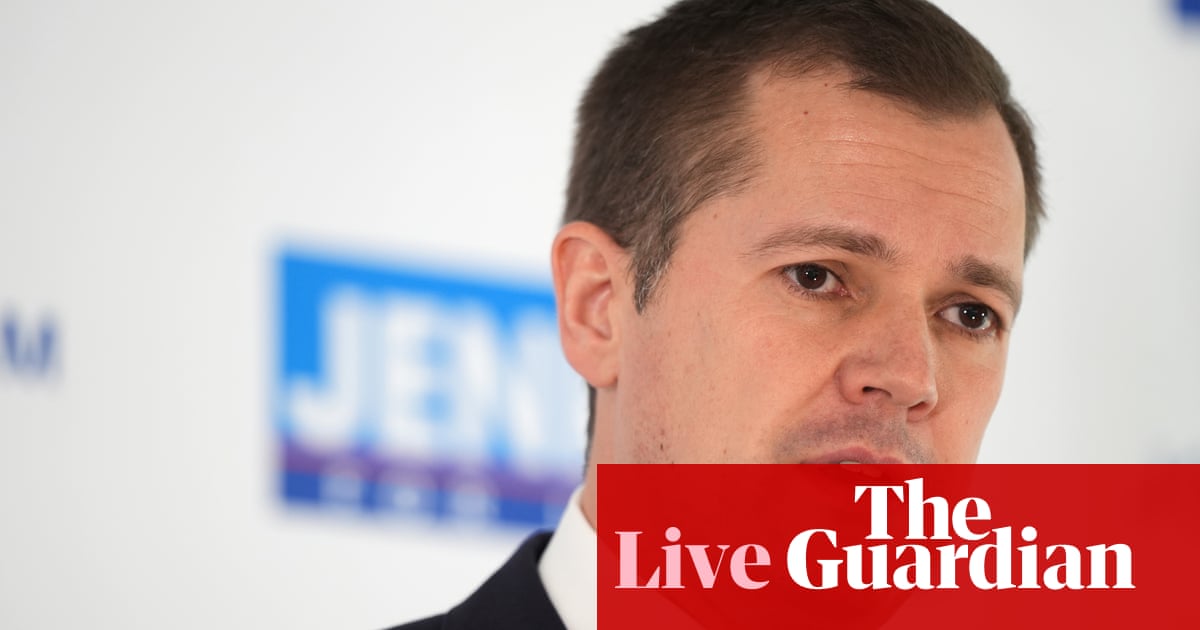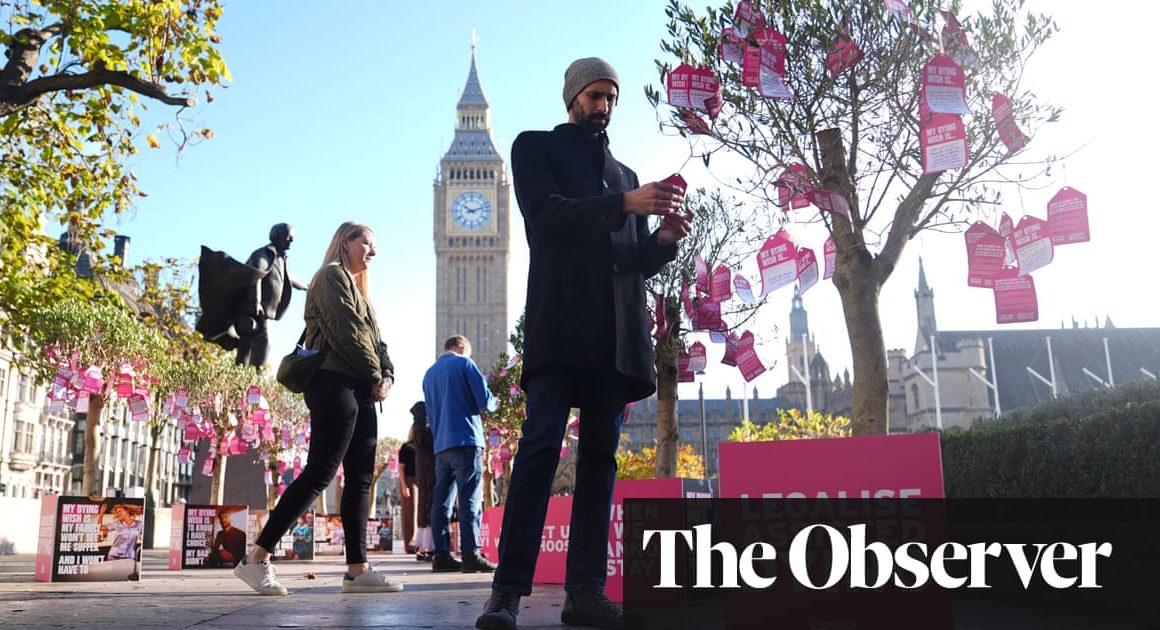Jenrick rejects claim he has privately told Tory MPs he will pivot back to centre if he becomes leader
In his interview on the Today programme this morning Robert Jenrick, who has been running on a rightwing in the Tory leadership contest, denied telling MPs in private that, if elected leader, he would flip back to the centre. But he also refused to accept the premise of the question, and rejected suggestions he was being hardline.
Justin Webb, the presenter, asked him about a report in the i suggesting that Jenrick’s rightwing stance is just tactical. The story says “senior Tories have cast major doubts over the chances of Kemi Badenoch or Robert Jenrick leading the Conservatives into the next election amid growing fears over party unity” and it includes this quote.
Some moderates hope the candidates will tack back to the centre ground, should they succeed in convincing the Tory party membership to elect them.
One member of the Shadow Cabinet said they had assurances Jenrick would rein in his right-wing polemic if elected party leader. “He has promised me he will turn to the centre,” they said. “I suspect he has told other people the same.”
After reading out the bit about turning to the centre, and telling other MPs the same, Webb said: “Have you?”
Jenrick replied:
I don’t know where that quote comes from, and I wouldn’t believe everything that you read in the papers.
When Webb tried again, and asked if Jenrick had promised anyone that he would return to the centre, Jenrick replied:
I haven’t said that, no.
But it is interesting that it took a second go to get a firm negative, and his first reponse was a classic non-denial. If it were true that he had said the same thing to various MPs, he genuinely would not know who spoke to the i. And ‘don’t believe everything you read in the papers’ is just a statement of fact.
Jenrick went on to say that that he did not accept the charge that he was lurching to the right in the first place. He said:
But let me just address the broader point that it raises. Because there are those who say that the Conservative party, were I to lead it, is going to shift to the right.
I actually don’t see these labels as at all relevant. What I want to see is the Conservative party occupy what I describe as the common ground of British politics.
Those are the things that millions of our fellow citizens care about. Most people do not consider themselves left or right.
When Webb put it to him that leaving the European convention on human rights was not a “common ground” position, because only around 20% of the public are in favour, he argued that he was being practical, not ideological. Jenrick said:
The reason that I believe we should leave the European convention on human rights is not an ideological one. I came to this view through the practical experience I had as a minister, in particular at the Home Office, where I saw that we as a country were not able to do the most basic duty of the state, which is to secure our borders.
We weren’t able to remove dangerous criminals from the country. We weren’t able to remove terror suspects from the country, and we certainly weren’t able to set up a robust but important and credible deterrent, such as the Rwanda one, because of our continued membership with the ECHR.
Now millions of people across our country – most people, I would argue – want us to do those things. My point is we will never be able to achieve their objectives unless we leave the ECHR.
Key events
Paul Scully, a Tory former minister who was himself unexpected excluded from the shortlist for a senior party position (London mayoral candidate) has joined those saying members will not get a real choice because James Cleverly was excluded from the final leadership ballot. Scully, who in Tory terms is a centrist like Cleverly, not a righwinger, posted these on social media last night.
Time Conservatives realised they lost the GE because of perceived lack of competence & direction. For 97 days an absence of activity from the Tories & amateur Labour performance has led to a 1% difference in the polls. But… 1/5
Yesterday’s leadership ballot will have woken people up to the fact the Tories haven’t passed the second stage of rebuilding – denial. (I’m ahead of them; stage 3, anger!)… 2/5
Our London mayoral selection process wasn’t supposed to be a dry run for a bigger stage. Cleverly & Tugenhadt were fishing in one pool, Badenoch & Jenrick in another. To cut out one philosophical choice denies members a real choice about how to rebuild… 3/5
Denied by MPs considering this to be a game, however it transpired with vote lending or individuals trying to second guess the result. The members will be all the poorer for that and the party’s fortune hangs in the balance… 4/5
We’ll see how Kemi & Rob frame this and deal with the situation but 100% of the people outside the party I’ve spoken to since, have taken a particular view /END
We’ll see how Kemi & Rob frame this and deal with the situation but 100% of the people outside the party I’ve spoken to since, have taken a particular view /END pic.twitter.com/atzCr8HkUL
— Paul Scully (@scullyp) October 10, 2024
Sue Gray not at nations/regions summit because she’s ‘been through quite a lot’ and ‘taking break’, says McFadden
Pat McFadden, the Cabinet Office minister, has said that Sue Gray is not attending the inaugral council of nations and regions meeting because she has “been through quite a lot” and is “taking a break”.
Gray was Keir Starmer’s chief of staff until she was abruptly replaced on Sunday, and she had been expected to attend the Edinburgh summit because she has been given a new job as the PM’s envoy for nations and regions.
But yesterday it emerged she would not be present.
In an interview on Sky News, asked why she was not attending, McFadden said:
Sue has been through quite a lot in the last few weeks.
I worked with her, she is a great colleague. She is taking a short break now and I think we should allow her the time in privacy to do that.
McFadden, who is at the meeting himself, later told LBC:
I know that [Gray] has not enjoyed being a figure in the public eye unlike me, who can come on your programme and speak for myself and answer any of your questions.
As an official, she can’t do that. Given what she has been through in the last few weeks, she has decided to take a bit of downtime, take a bit of a break, and I quite understand why.
Asked how long Gray’s break would be, McFadden replied:
I don’t think it will be long, but let’s give her a bit of space and privacy after somebody who, as I said, can’t speak up for themselves, finding themselves on the front pages of the newspapers in a way that she has not wanted to be.
Jenrick suggests it was a mistake for him as minister to get cartoon murals covered up at asylum centre for children
Robert Jenrick has suggests it was a mistake for him to order murals of cartoon characters at a children’s asylum centre to be painted over when he was immigration minister.
Only last week, at Tory conference, Jenrick was defending the decision, which at the time led to him accused of being heartless.
But in an interview with LBC this morning he said he would not do the same thing again.
Asked about the incident, Jenrick said he wanted the murals covered up because he was “very worried at the time and continue to be about those people who are adults, coming into our country illegally and posing as children”.
He went on:
So I did feel that it was important that at the initial point of arrival we treat these places as law enforcement environments with a view to trying to weed out those people who are actually just posing as children.
I think that was the right decision, but of course there are lessons to be learned from it, and I probably would have done things differently if I had my time again.
Asked if that meant he would not do it again, he replied:
No I wouldn’t, but what I did want to do then and I feel just as passionately about today, is that we have got to weed out those people who are posing as children when they first arrive.
UK economy returns to growth in boost to Rachel Reeves before budget
The UK economy returned to growth in August after flatlining for two months, in a boost for the chancellor, Rachel Reeves, before the autumn budget, Richard Partington reports.
The main announcement from No 10 this morning is “thousands of jobs in green industries announced as the UK government welcomes more than £24bn of private investment for pioneering energy projects ahead of the International Investment Summit on 14 October”.
In his London Playbook briefing for Politico, Stefan Boscia says a lot of this is not strictly new.
The government’s big announcement going into this morning was the news that private sector firms have poured £24 billion in new investment into green energy projects. This includes a £12 billion investment from Spanish firm Iberdrola and £8 billion from Denmark’s Ørsted.
Not so fast: However, Politico’s Senior UK energy correspondent Charlie Cooper texts in to say most of the money involved is not actually new. He points out that the Iberdrola and Ørsted investments were publicly announced more than a month ago and came through Britain’s contracts for difference scheme. Nice try, though!
To be fair, ‘strictly new’ is a high hurdle. If newspapers, and news websites, refused to report things that have been written about somewhere already, they would all be a lot more empty.
Jenrick rejects claim he has privately told Tory MPs he will pivot back to centre if he becomes leader
In his interview on the Today programme this morning Robert Jenrick, who has been running on a rightwing in the Tory leadership contest, denied telling MPs in private that, if elected leader, he would flip back to the centre. But he also refused to accept the premise of the question, and rejected suggestions he was being hardline.
Justin Webb, the presenter, asked him about a report in the i suggesting that Jenrick’s rightwing stance is just tactical. The story says “senior Tories have cast major doubts over the chances of Kemi Badenoch or Robert Jenrick leading the Conservatives into the next election amid growing fears over party unity” and it includes this quote.
Some moderates hope the candidates will tack back to the centre ground, should they succeed in convincing the Tory party membership to elect them.
One member of the Shadow Cabinet said they had assurances Jenrick would rein in his right-wing polemic if elected party leader. “He has promised me he will turn to the centre,” they said. “I suspect he has told other people the same.”
After reading out the bit about turning to the centre, and telling other MPs the same, Webb said: “Have you?”
Jenrick replied:
I don’t know where that quote comes from, and I wouldn’t believe everything that you read in the papers.
When Webb tried again, and asked if Jenrick had promised anyone that he would return to the centre, Jenrick replied:
I haven’t said that, no.
But it is interesting that it took a second go to get a firm negative, and his first reponse was a classic non-denial. If it were true that he had said the same thing to various MPs, he genuinely would not know who spoke to the i. And ‘don’t believe everything you read in the papers’ is just a statement of fact.
Jenrick went on to say that that he did not accept the charge that he was lurching to the right in the first place. He said:
But let me just address the broader point that it raises. Because there are those who say that the Conservative party, were I to lead it, is going to shift to the right.
I actually don’t see these labels as at all relevant. What I want to see is the Conservative party occupy what I describe as the common ground of British politics.
Those are the things that millions of our fellow citizens care about. Most people do not consider themselves left or right.
When Webb put it to him that leaving the European convention on human rights was not a “common ground” position, because only around 20% of the public are in favour, he argued that he was being practical, not ideological. Jenrick said:
The reason that I believe we should leave the European convention on human rights is not an ideological one. I came to this view through the practical experience I had as a minister, in particular at the Home Office, where I saw that we as a country were not able to do the most basic duty of the state, which is to secure our borders.
We weren’t able to remove dangerous criminals from the country. We weren’t able to remove terror suspects from the country, and we certainly weren’t able to set up a robust but important and credible deterrent, such as the Rwanda one, because of our continued membership with the ECHR.
Now millions of people across our country – most people, I would argue – want us to do those things. My point is we will never be able to achieve their objectives unless we leave the ECHR.
Tories would have to support ECHR withdrawal ‘to serve in my shadow cabinet’, says Jenrick
Good morning. Keir Starmer is in Edinburgh this morning for the first meeting of the Council of Nations and Regions. To publicise it, the government is flagging up an announcement about “more than £24bn of private investment for pioneering energy projects”, although it has been pointed out that some of this is not strictly new. As for the meeting itself, the main story to emerge so far is that Sue Gray has not turned up, despite being appointed as the PM’s new envoy for nations and regions.
Meanwhile, the Conservative party is still generating news. Robert Jenrick, one of the two candidates left in the leadership contest, gave an interview to the Today programme this morning with various interesting lines.
Jenrick confirmed that, if he is elected leader, he will expect members of the shadow cabinet to sign up to his plan for Britain to leave the European convention on human rights. This is significant because it could lead to many senior people in the parliamentry party refusing to serve on the frontbench. There are Tories who were happy to go along with Rishi Sunak’s position (not ruling out ECHR withdrawal as an option) who would draw the line at Jenrick’s position. It is also quite possible that some of them would swallow their principles, and go along with a Jenrick policy they regard as unwise just for the sake of a good shadow cabinet job, but it is hard to know at this point how pervasive this shameless opportunism would be.
When asked if all shadow cabinet ministers would have to agree to ECHR withdrawal if he were leader, Jenrick said:
It would be one of the stable of Conservative policies, so yes, we would go into the next election with it in our manifesto.
Asked if that meant James Cleverly, the former home secretary and former foreign secretary who was seen as the leadership candidate who did best at party conference, but who was unexpectedly voted out of the contest on Wednesday, would be out of his shadow cabinet, Jenrick replied:
I believe it’s very important that we do this … I’ve already said to James, who is a friend, someone I respect enormously, that I would be delighted for him to serve in the shadow cabinet should he want to do so.
Jenrick also claimed that the party was not as divided on this issue as people claimed.
I don’t think the point of difference is as big as perhaps you suggest it is. There is now a consensus within the Conservative party that the ECHR is not working in the interests of the British people, for all the reasons that I’ve just described.
Most people now are saying that, at a bare minimum, we need to reform the ECHR.
My position is simply one stage further, which is to say that – perhaps unlike others, because I’ve given this a great deal of thought, and that’s no disrespect to other colleagues, they haven’t always seen the things I’ve seen by virtue of having served as a minister where I have – I’ve come to the conclusion that we can’t reform it.
Reform requires the unanimous agreement of 46 member states from Iceland to Andorra. It’s not going to happen.
What I’m proposing is simply that we leave and that we replace it with a British bill of rights.
In the interview Jenrick also denied telling Tory MPs in private that, if he wins the leadership, he will stop being rightwing and tack back to the centre. But he also rejected the suggestion that he had lurched to the right in the first place, and so there is some ambiguity in what he meant. I will do another post on that soon.
Here is the agenda for the day.
9am: Keir Starmer is meeting the Scottish and Welsh first ministers, and Northern Ireland’s first minister and deputy first minister, at the first meeting of the Council of Nations and Regions. He will start with bilateral meetings, then there will be a collective meeting with first ministers, and then, at noon, a full meeting with metro mayors. In the afternoon Starmer is giving media interviews.
11.30am: Downing Street holds a lobby briefing.
3.10pm: Rhun ap Iorwerth, the Plaid Cymru leaders, speaks at his party’s conference in Cardiff.
If you want to contact me, please post a message below the line (BTL) or message me on social media. I can’t read all the messages BTL, but if you put “Andrew” in a message aimed at me, I am more likely to see it because I search for posts containing that word.
If you want to flag something up urgently, it is best to use social media. I’m still using X and I’ll see something addressed to @AndrewSparrow very quickly. I’m also trying Bluesky (@andrewsparrowgdn) and Threads (@andrewsparrowtheguardian).
I find it very helpful when readers point out mistakes, even minor typos (no error is too small to correct). And I find your questions very interesting too. I can’t promise to reply to them all, but I will try to reply to as many as I can, either BTL or sometimes in the blog.











